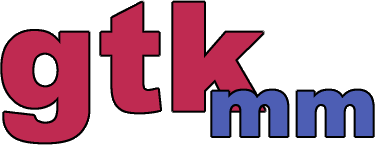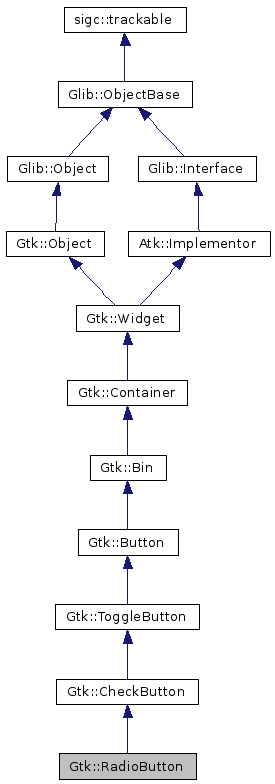
 |

It is only when multiple radio buttons are grouped together that they become a different user interface component in their own right. Every radio button is a member of some group of radio buttons. When one is selected, all other radio buttons in the same group are deselected. A Gtk::RadioButton gives the user a choice from many options. After constructing the first RadioButton in a group, use get_group() and provide this Group to the constructors ot the other RadioButtons in the same group. To remove a Gtk::RadioButton from one group and make it part of a new one, use set_group().
Public Types | |
| typedef RadioButtonGroup | Group |
Public Member Functions | |
| Group | get_group () |
| Get the radio button's group. | |
| const GtkRadioButton* | gobj () const |
| Provides access to the underlying C GtkObject. | |
| GtkRadioButton* | gobj () |
| Provides access to the underlying C GtkObject. | |
| RadioButton (Group& group, const Glib::ustring& label, bool mnemonic=false) | |
| Create a button belonging to the specified group, with a label inside. | |
| RadioButton (Group& group) | |
| Create an empty RadioButton belonging to the specified group, into which you can add() a widget. | |
| RadioButton (const Glib::ustring& label, bool mnemonic=false) | |
| RadioButton () | |
| void | reset_group () |
| Remove the radio button from the group. | |
| void | set_group (Group& group) |
| Set the radio button's group. | |
| Glib::SignalProxy0<void> | signal_group_changed () |
| |
| virtual | ~RadioButton () |
Protected Member Functions | |
| virtual void | on_group_changed () |
Related Functions | |
| (Note that these are not member functions.) | |
| Gtk::RadioButton* | wrap (GtkRadioButton* object, bool take_copy=false) |
| A Glib::wrap() method for this object. | |
| virtual Gtk::RadioButton::~RadioButton | ( | ) | [virtual] |
| Gtk::RadioButton::RadioButton | ( | ) |
| Gtk::RadioButton::RadioButton | ( | const Glib::ustring & | label, | |
| bool | mnemonic = false | |||
| ) | [explicit] |
| Gtk::RadioButton::RadioButton | ( | Group& | group | ) | [explicit] |
Create an empty RadioButton belonging to the specified group, into which you can add() a widget.
If you wish to add a Gtk::Label, you may want to use the Gtk::RadioButton(const Group& group, const Glib::ustring& label, bool mnemonic) constructor directly instead.
| Gtk::RadioButton::RadioButton | ( | Group& | group, | |
| const Glib::ustring & | label, | |||
| bool | mnemonic = false | |||
| ) |
Create a button belonging to the specified group, with a label inside.
You won't be able to add a widget to this button since it already contains a Gtk::Label.
| Group Gtk::RadioButton::get_group | ( | ) |
Get the radio button's group.
This group may be passed to the constructors of other radio buttons, or used with set_group().
| const GtkRadioButton* Gtk::RadioButton::gobj | ( | ) | const [inline] |
| GtkRadioButton* Gtk::RadioButton::gobj | ( | ) | [inline] |
| virtual void Gtk::RadioButton::on_group_changed | ( | ) | [protected, virtual] |
| void Gtk::RadioButton::reset_group | ( | ) |
Remove the radio button from the group.
| void Gtk::RadioButton::set_group | ( | Group& | group | ) |
Set the radio button's group.
You can obtain a suitable group from another radio button by using get_group().
| Glib::SignalProxy0< void > Gtk::RadioButton::signal_group_changed | ( | ) |
void on_my_group_changed()
| Gtk::RadioButton* wrap | ( | GtkRadioButton * | object, | |
| bool | take_copy = false | |||
| ) | [related] |
A Glib::wrap() method for this object.
| object | The C instance. | |
| take_copy | False if the result should take ownership of the C instance. True if it should take a new copy or ref. |